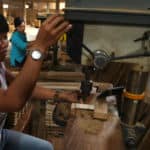New Thinking to Advance Gender Equality: ‘Radical Collaboration’ in Action
If you’re a fan of gender equality, then the Women Deliver conference is your Super Bowl. Held every three years, the conference attracts feminists, gender equality advocates, impact investors and international development experts from around the world. I had the opportunity to attend this year, joining over 8,000 people in my hometown of Vancouver for an intense four days of learning and dialogue.
Over and over again, the phrase I heard was “radical collaboration.” It means refusing to limit ourselves to traditional competitive business models and siloed thinking, and actively bringing diverse viewpoints and experiences together to identify and solve the toughest challenges faced by women and girls.
The idea is compelling. We don’t want to wait centuries or even decades to achieve equality for all women everywhere. We want it now. And to accomplish a massive systemic transformation of that magnitude requires new thinking. Radical thinking.
A number of studies point to the fact that collaboration drives performance, but many companies struggle to collaborate effectively. This is often due to internal barriers like hierarchical decision-making structures, how information flows within the organization, and how people are compensated. A possible solution? More female leadership, as there is evidence to suggest that women are better at collaborative decision-making than men.
Radical collaboration aims to create a cooperative, trusting and motivated environment within a team, organization or global movement. Here are a few ways it can be put into practice:
Use co-creation and community-developed solutions to bring diverse voices into business decisions
This can lead to novel partnerships between businesses and the people and organizations affected by their practices. Take for example the NextGen Cup Challenge, which brought together food companies like Starbucks and McDonalds to fund a multi-year initiative to redesign and commercialize the to-go coffee cup. While convenient for serving both hot and cold beverages, too many of these fiber cups end up in landfills, increasing greenhouse gas emissions and wasting valuable resources. The Challenge aimed to solve this problem: Advised by the World Wildlife Fund and powered by OpenIDEO, the consortium received 500 submissions of new cup design ideas from over 50 countries, and selected six solutions for acceleration and scale-up.
At Deetken Impact we are also seeing a shift toward community-developed solutions related to infrastructure projects. The practice of “community consultation” is a required part of the development process in most countries. But although this gives the community the opportunity to be heard, it doesn’t necessarily empower communities to make decisions about the project. As an example of the shift to a more responsive approach, we recently financed a solar project in a rural area of Panama where a broad set of representatives from adjacent communities were responsible for using a portion of the project budget for community enhancements. Representatives included village government, the local health ministry, community leaders and school parents. Together, they chose to make structural improvements to a community school, install a potable water tank, and provide financial support for local soccer tournaments. The project is now operational, the community and the developer have a good working relationship, and there are plans for additional improvements including street lighting and drainage.
Relentlessly amplify individuals and organizations with shared objectives
This means actively looking for opportunities to promote the work and achievements of others working towards the same big goals. At Women Deliver, I had the opportunity to participate in a very different kind of conference event focused on this kind of amplification. Hosted by globally-recognized gender lens investing leader Suzanne Biegel and the Gender Smart Investing Summit, the “Power of Finance” event was packed with people from impact investing, civil society and government with a common interest in using capital to advance gender equality. We were invited to form 19 “solution circles” focused on specific themes, such as using finance to address gender-based violence, or investing in women’s health in Latin America. We each shared a practical challenge that we faced in our work, and then collaborated on solutions.
For example, if we are interested in the job creation impact of our investments, how do we move beyond “counting” jobs to assessing the quality of those jobs? Or how do we encourage mainstream investors like pension funds to view lack of diversity in management and governance as a key investment risk? I left with a clear understanding of relevant projects underway across the gender lens investing space, two pages of notes, a fistful of business cards and a mind buzzing with fresh ideas.
Reach across sectors or silos to build new kinds of teams and partnerships
At Deetken Impact, we have recently announced our own radical collaboration. Recognizing the importance of diverse voices in investment management, we formed a joint venture with leading women’s development organization Pro Mujer to launch the Ilu Women’s Empowerment Fund, an investment fund supporting women entrepreneurs in Latin America. Pro Mujer is a provider of financial, health and educational services to underserved women across the region. In a traditional asset management model, an organization like Pro Mujer would be solely a recipient of capital; in this model, they are embedded into the investment manager as an equity partner, with real input into investment sourcing, due diligence and decision-making. With support from the Overseas Private Investment Corporation, the U.S. development finance institution, we will together invest US $35 million into businesses that promote women in leadership, that offer products and services that meet the needs of women and girls, and that provide gender-sensitive value chains and workplace equity.
This experience has shown us that radical collaboration is easier than it sounds, and that opportunities are everywhere. It could mean broadening your organization’s annual strategy session to include people at different levels of seniority, rather than just department heads. Or you might create a process for community members to be more meaningfully involved in the design of a program that will affect them.
When confronted with a challenging problem, radical collaboration means including as many stakeholders as possible in decision-making, especially those who aren’t usually at the table. It means promoting people and organizations you admire, instead of only promoting yourself. It means focusing on teamwork instead of competition. Is that really so radical?
Alexa Blain is co-founder and Managing Partner of Deetken Impact.
Photo courtesy of Brooke Cagle.
- Categories
- Impact Assessment, Investing



